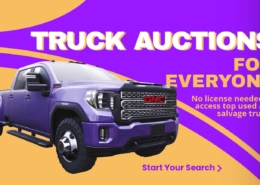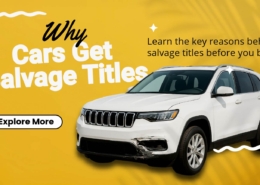 https://auction.ridesafely.com/images/2018/10/banner-truck-auctions-for-everyone.jpg
865
1440
RideSafely
/images/2025/01/ridesafely-logo.svg
RideSafely2025-09-26 12:10:232025-09-26 14:53:10How to Buy Your Next Truck at an Auto Auction
https://auction.ridesafely.com/images/2018/10/banner-truck-auctions-for-everyone.jpg
865
1440
RideSafely
/images/2025/01/ridesafely-logo.svg
RideSafely2025-09-26 12:10:232025-09-26 14:53:10How to Buy Your Next Truck at an Auto AuctionFlood-damaged vehicles are carving out a noticeable spot in the used car world, catching the attention of a wide range of buyers. From veteran rebuilders to parts sellers and global shippers, many are finding value in these cars. In this guide, we’ll take a closer look at why they’re in demand, what risks come with them, and innovative ways to maximize your return when buying flood-damaged cars.
What Are Flood-Damaged Cars?
Flood-damaged cars are vehicles that have been exposed to water intrusion, often as a result of hurricanes, storms, or overflowing rivers. Water can severely impact a car’s mechanical, electrical, and structural systems. These vehicles are usually written off by insurance companies and sold at auction with branded flood or salvage titles.
Who Buys Flood-Damaged Cars?
While many traditional auto auctions require a bid card or dealer license to participate, individuals can still buy cars at auctions without a bid card or dealer license by using licensed broker services or public auction platforms that facilitate the process for retail buyers.
1. Automotive Rebuilders and Mechanics
We see many licensed automotive rebuilders and experienced mechanics actively purchasing flood-damaged cars at auctions. Their specialized skills enable them to diagnose, repair, and refurbish water-impacted systems, often bringing the vehicles back to roadworthy condition. Rebuilders leverage their expertise to acquire vehicles at a fraction of their pre-flood value and resell them for profit after comprehensive repairs.
2. Used Car Dealers
Used car dealerships source flood-damaged vehicles, particularly those with minimal water exposure or cosmetic damage. By investing in restoration, dealers can offer affordable inventory to budget-conscious customers. Dealers with established reconditioning capabilities are best positioned to mitigate the risks associated with flood damage.
3. Parts Salvage Companies
Parts salvage companies represent another major buyer group. Flood-damaged cars often contain a range of components—engines, transmissions, body panels, electronics—that remain undamaged and can be sold as individual parts. Salvage companies systematically dismantle these vehicles, cataloging and reselling usable parts to repair shops and the public. For salvage operations, flood vehicles provide an opportunity to salvage valuable parts from a totaled car, which can be resold for profit.
4. International Exporters
Exporters, particularly those serving markets with less stringent title branding and repair regulations, find significant value in flood-damaged cars. Many countries allow import and registration of such vehicles after repairs. Exporters source vehicles at auction, arrange for overseas shipping, and manage local reconditioning for resale abroad.
5. Bargain Seekers and DIY Enthusiasts
A growing segment of private buyers—DIYers and bargain hunters—pursue flood-damaged cars as restoration projects. Motivated by the prospect of savings, these buyers often possess mechanical knowledge or a network of trusted repair specialists. They accept the risks and time investment in exchange for below-market acquisition prices.
Interested in electric vehicles? With the rise of EVs, buying a salvage electric vehicle is becoming more common—but it comes with unique considerations, especially after water damage.
Motivations Behind Buying Flood Cars
- Profit Margins: Substantial discounts on auction prices allow for attractive resale profits after repairs or part-outs.
- Parts Availability: Sourcing rare or expensive parts from flood-damaged vehicles can be more cost-effective than purchasing new.
- Export Advantages: Regulatory differences in destination markets provide opportunities for significant value recovery.
- Customization Potential: Enthusiasts may use flood vehicles as platforms for project builds or custom modifications.
Flood-Damaged Cars: Risks and Rewards
Flood-damaged vehicles present both significant risks and compelling rewards:
Risks:
- Hidden electrical system failures may surface long after initial repairs.
- Mold, corrosion, and contaminated fluids can compromise vehicle safety and longevity.
- Insurance and financing may be difficult to secure for flood-branded vehicles.
Rewards:
- Acquisition costs up to 60–70% below clean-title equivalents.
- Access to parts and platforms otherwise unavailable or cost-prohibitive.
- Strong export demand from markets tolerant of flood histories.
How to Buy Flood-Damaged Cars Safely
- Source Vehicles from Reputable Auctions: Major platforms such as Copart, IAAI, and RideSafely provide vehicle histories and title disclosures.
- Obtain Detailed Condition Reports: Review auction photos, mechanical checklists, and waterline documentation.
- Inspect Thoroughly: Engage a professional inspector when possible, focusing on electrical components, interior, and undercarriage.
- Budget for Unexpected Repairs: Allocate extra funds for latent issues, including rust remediation and module replacements.
- Understand Title Branding: Verify how flood titles will affect registration, resale, and insurance options in your region.
First-time buyers often turn to salvage car auctions to learn the ropes and turn a profit, gaining hands-on experience in the process.
Flood Titles and Legal Considerations
Flood-damaged cars are typically issued branded titles, such as “Flood,” “Salvage,” or “Rebuilt,” depending on local jurisdiction. These designations impact the vehicle’s legal status, resale potential, and insurability.
- Flood Title: Indicates significant water exposure; may restrict registration in some states.
- Salvage Title: Vehicle declared a total loss but can be rebuilt and re-titled after inspection.
- Rebuilt Title: Previously salvage or flood-branded car that has passed post-repair inspection.
Always consult a licensed electrical mechanic or someone familiar with the process, as well as your state DMV and insurance provider, before finalizing a purchase.
If you intend to restore and resell, it’s important to know how to remove a salvage title according to state regulations, ensuring your investment can be legally driven or sold.
Resale and Export Opportunities
Flood-damaged vehicles, after thorough restoration, may be resold domestically with proper disclosure or exported to international markets. Export buyers often target American vehicles due to their availability and favorable pricing, accepting the tradeoff of prior flood history.
Export Process:
- Purchase at U.S. auction
- Secure transport to port
- Ship overseas
- Complete repairs and inspection in destination country
- Register and market for local resale
Platforms like RideSafely let you explore a diverse range of vehicles, including flood-damaged and specialty models.
The Flood-Damaged Car Lifecycle
| Stage | Action/Event | Next Step | End Outcome |
|---|---|---|---|
| 1 | Flood Event | Insurance Company Declares Total Loss | Proceeds to Auction |
| 2 | Auction Sale |
|
|
| 3 | Rebuilder/Mechanic Parts Salvage Exporter DIY Enthusiast | Repairs Vehicle Dismantles Vehicle Ships Vehicle Overseas Restores for Own Use | Resells as Roadworthy Car Sells Usable Parts Repairs & Sells in Foreign Market Keeps as Personal Project |
Conclusion: Should You Buy a Flood-Damaged Car?
Flood-damaged cars offer unique opportunities for buyers who understand the associated risks and rewards. By sourcing carefully, conducting thorough inspections, and recognizing legal and financial implications, buyers can unlock substantial value in this specialized market. Whether for rebuilding, parts, or export, flood vehicles remain a viable and profitable option in the global automotive ecosystem.
Flood-Damaged Cars FAQ
What is a flood-damaged car?
A flood-damaged car is a vehicle that has been exposed to water intrusion from events like hurricanes, heavy rains, or rising water levels. This exposure can affect mechanical, electrical, and structural components, often resulting in a “flood” or “salvage” branded title.
Who typically buys flood-damaged cars?
Flood-damaged cars are commonly purchased by automotive rebuilders, salvage parts companies, used car dealers, exporters, and DIY enthusiasts looking for project vehicles or affordable options.
Are flood-damaged cars safe to drive after repairs?
If properly inspected and repaired by qualified professionals, some flood-damaged cars can be made roadworthy. However, hidden damage—especially to electrical systems—can still pose safety and reliability concerns.
Can I get insurance for a flood-damaged car?
Insurance options vary. Some insurers may only offer limited coverage (such as liability) or may refuse to insure cars with flood or salvage titles. It’s essential to check with your insurance provider before purchasing.
How do I check if a car has flood damage?
Always request a vehicle history report (such as Carfax or AutoCheck), inspect for signs of water intrusion (rust, mildew, water lines), and, if possible, have a trusted mechanic perform a thorough inspection.
Can I resell a flood-damaged car?
Yes, but full disclosure is required. The title branding will impact resale value and marketability. Many flood-damaged cars are exported to markets with different regulations.
What are the risks of buying a flood-damaged car?
Potential risks include hidden corrosion, ongoing electrical problems, mold, and reduced resale value. Repairs may be costly or not fully resolve all issues.
Can I buy flood-damaged cars at auction without a dealer license?
In most cases, a dealer license is required for direct access to auctions. However, broker services or public platforms like RideSafely allow individuals to purchase without a license by acting as intermediaries.
Are there special considerations for flood-damaged electric vehicles (EVs)?
Yes, water exposure can severely affect EV battery packs, wiring, and electronic modules. Repairs can be complex and expensive, requiring specialized knowledge.
What steps should I take before buying a flood-damaged car?
- Research the auction platform or seller
- Review the vehicle history report
- Budget for potential repairs
- Inspect the vehicle thoroughly or hire a professional
- Confirm insurance and registration requirements






Leave a Reply
Want to join the discussion?Feel free to contribute!